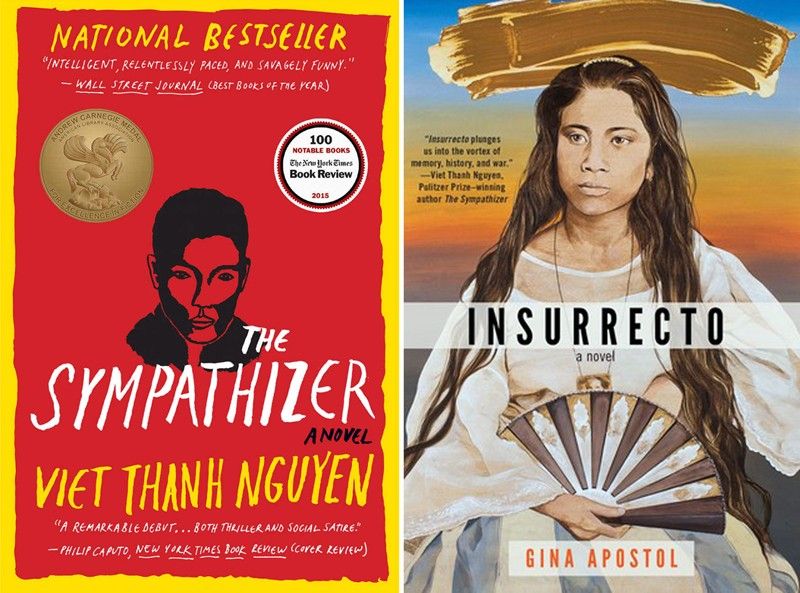Two novelists revisit ‘Apocalypse now’

NBS invited awarded Asian-American authors to talk books, movies and empire collapse.
It’s no coincidence that National Book Store invited both Gina Apostol, PEN awardee and author of Insurrecto and Gun Dealer’s Daughter, to sit beside Pulitzer-winning novelist Viet Thanh Nguyen (for 2016’s The Sympathizer) in the Salon Room of Raffles Makati — just as it’s no coincidence that the complicated filming of Apocalypse Now on these shores lies at the (dark) heart of both of their recent novels. The Francis Ford Coppola filming, in Manila and Baler from 1975 to 1977, sought to remake the Philippines into Vietnam and create the ultimate allegory of American imperialism — or Hollywood hubris. It did so in ways unexpected, and both Apostol and Nguyen offer their own takes on that iconic experience in separate novels: in The Sympathizer, the unnamed narrator takes a job as a Vietnamese refugee wrangler working for The Auteur on a big-budget war movie filmed here; and in Insurrecto, the daughter of a Coppola-like director joins Magsalin, a Filipino translator, in retracing both the Apocalypse Now-like sets of her father and a modern historical movie retelling the events of Balangiga, Samar, in 1901.
Both are richly layered, critical, yet playful and entertaining examinations of Asian identity, at home and as Asian-Americans, and it’s no surprise that National Book Store invited them to head the latest Philippine Readers and Writers Festival last weekend, with the theme “Borderless: Bringing Stories from Asia to the World.” They’ve both succeeded immensely, gaining readers not just in western countries but opening doors for more Asian voices in English literature.
I ask why Apocalypse Now has had such an effect on writers. Is it simply a convenient example of Hollywood global branding? Is it a layered metaphor for colonial reinvention of Asia?
For Nguyen, based in LA, “Part of the layering, besides all that, is enjoyment. It’s fun to write about Hollywood because many of us enjoy the spectacle of what they put on, and Hollywood itself is a spectacle.” But beyond the fun subject matter, “There are these layers where what Hollywood produces is important, in the sense that American culture is powerful and global, because America is powerful and global. So movies aren’t just entertainment but also have a role to play in shaping our understanding of our culture and history. So even though the US lost the war in fact, it won the war in memory through these Vietnam movies. It’s still not dead.” Even today, “America’s still making these movies, still controlling the narrative” of Vietnam’s history.
Apostol has a more personal connection: “What struck me about the movie was the sight of the Philippines in the ‘70s. The other stuff wasn’t as interesting to me as was looking at scenes of Manila, the Philippines, that were synchronic with my own childhood.” She later read Eleanor Coppola’s diary about the filming and thought, “‘Oh, I remember that typhoon. I remember the frogs coming into the house.’” She was aware of the filming, as a college student, but only later felt the connections through on-set diaries.
For Nguyen, whose first novel was rejected by 13 American publishers before being accepted by a British one (of Indian-Malaysian descent), a Vietnam War story is a hard sell in the US. “It’s about the role of US power globally. So I wanted readers to understand the Vietnam War as not just a single war, as Americans might understand it, but as one episode in a series of wars that’s still going on today. That’s a view that most Americans do not share, because it’s disturbing; it implies that America is an imperialist global power; most Americans refuse to understand that about their country.”

Viet Thanh Nguyen and Gina Apostol settle in at Raffles Makati’s Salon Room.
We naturally talk about the political climate under President Trump these days. Is the eruption of division and racism a temporary blip?
“I don’t see it as a blip,” says Apostol, based in New York. “I see it as an eruption of something that is America, and I think Americans are suddenly seeing something of themselves that maybe they don’t want to see — the hegemonic weirdness.” Still, she’s optimistic that things can change, and that books make a difference. “I wouldn’t write otherwise. That’s the thing about the writer, you might be writing about horrific things, but the fact of writing is a moment of optimism.”
Nguyen sees another duality in the American character: “Looking at President Obama and President Trump back to back is not a coincidence.” He believes there are “two faces of the American character” that have always been there since its very origins. “Like many other countries, the United States is not unique in being contradictory; it has very contradictory impulses: one is for tolerance and inclusiveness, and the other is for racism and exploitation. And both co-exist at the same time. It’s shocking when we see them back to back, but it’s there.” (For proof of this, one need only look at 8chan, an underbelly of online incel-driven racist hatred that was the streaming thread of choice for the recent El Paso mass shooter. That site — run by two Americans based in the Philippines, BTW — has now reportedly been “terminated.”) Nguyen goes even further, looking at the outcome of America’s contradictory impulses: “If we look at the larger scale of history, civilizations collapse, often out of their own contradictions, not external pressures.”
For Nguyen and Apostol, everything is duality: both insiders and outsiders, looking at past and present, reflecting their dual positions in society, both Asian and American. One chapter in Insurrecto is titled “Everything in the world is doubled,” while the opening sentence from The Sympathizer reads: “I am a spy, a sleeper, a spook, a man of two faces. Perhaps not surprisingly, I am also a man of two minds.”
Being both outsiders and insiders offers them an ironic distance, which comes through in humor. “Satire and irony are effective tools for making the pill go down a little bit easier,” notes Nguyen. Gina adds: “For me, I’m from Tacloban, so if you spoke Waray instead of English, you were fined. Like you’re a criminal because you speak the language from home. I think that kind of linguistic divide created something in me about how to live in the world, this inside-outside duality.”
Nguyen mentions another example of duality, when he was visiting Harvard at the time of Obama’s inauguration, and everyone in the room stood up for the “Star-Spangled Banner” — everyone except three people at his table: himself, a German, and a Mexican.
This reminds me of Philippine cinemas, where I’m obliged to stand up for the Lupang Hinirang, but not to place my hand over my heart. I mention this practice to Nguyen, and he finds it puzzling, until Apostol explains it was part of “nation-making” after the US left in 1946, because the anthem had been banned before that. Still, she says, “it’s interesting, this thing between nation-making and repression, where it really ends up being this annoying, nationalist, bloated moment every time you go to the movies.” And yet, she admits with a laugh, “when I’m in the movies here, and a foreigner doesn’t stand up, I immediately feel like saying, ‘What the f**k? Get up! Stand up!’ It’s a weird response.”
Always that duality, between inside and outside.
* * *
For more on last week’s Philippine Readers and Writers Festival, check out #GoReadWrite2019, #PRWF2019, @nationalbookstore on Instagram and @nbsalert on Facebook.















